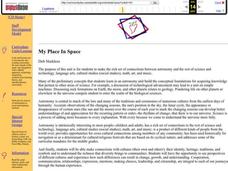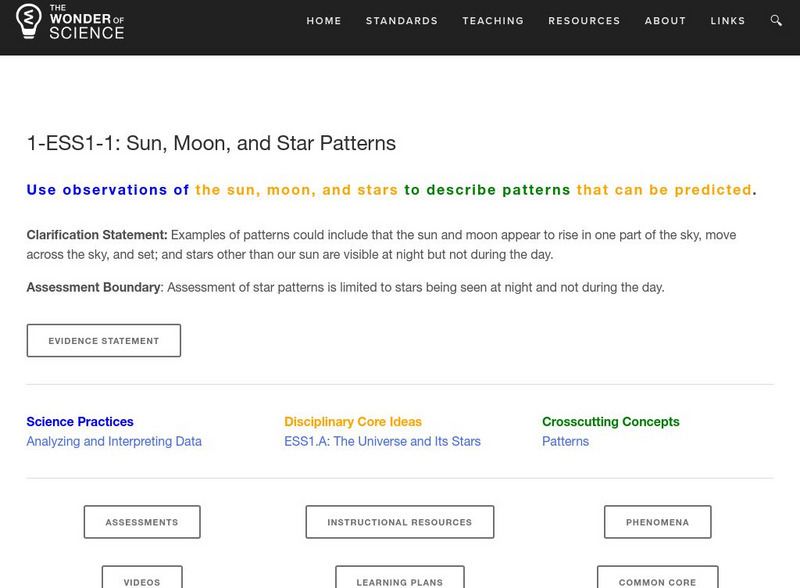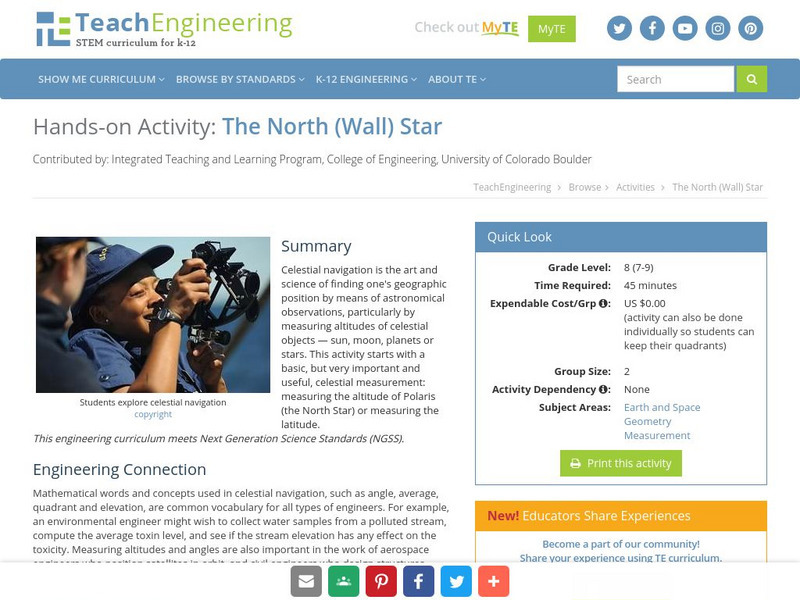Curated OER
Knowledge Quiz: The Universe
In this universe quiz worksheet, students complete a set of 10 multiple choice questions that cover a variety of concepts about the universe: constellations, black holes, the solar system, etc.
Curated OER
Water 1: Water and Ice
Students explore forms that water can take and examine the water cycle. In this hands-on science lesson, students participate in activities that require them to change water to a solid and back to a liquid again.
Curated OER
Sky 2: Shadows
students will explore making shadows and tracking the movement of an object over the course of a day to look for patterns. It is best to couple this shadow activity with reading the book, Bear Shadow, and making a map of Bear's...
Curated OER
Water and Ice
Students study the liquid and solid states of water. In this water states lesson, students complete three experiments to study water as it cycles from a liquid state to a solid state and back. Students finish with a Venn Diagram...
Curated OER
The Sky and the Dichotomous Key
Pupils use a dichotomous key to distinguish between different types of clouds
Curated OER
My Place In Space
The purpose of this unit is for students to make the rich set of connections between astronomy and the rest of science and technology, language arts, cultural studies (social studies), math, art, and music.
Curated OER
Fronts
Fourth graders define cold and warm fronts, explain how they are formed and they ways that they affect the weather.
Curated OER
Thunderstorms
Fourth graders investigate the attraction between two different charges to explain the concept of lightning in a thunderstorm.
Curated OER
Dew Point
Fourth graders investigate saturation conditions and measure the dew point. They conduct an experiment, record data on a worksheet, and measure the dew point in the experiment.
Curated OER
Cold Fronts And Warm Fronts
Students simulate the movement of cold and warm fronts as they listen to a story about the weather and Mr. Sun. They brainstorm the characteristics of each type of front then write about which front they would prefer if they were a...
Curated OER
Retrograde Motion
Students study the motions of the heavenly bodies. In this space lesson students use models to show a variety of schemes explaining the motions.
Curated OER
Space - In Your Face or Not?
Second graders, in groups, examine how it doesn't matter if they can see the planets in the solar system or not--they're there.
Curated OER
What Shape Is It?
Learners predict the shape of an unknown object by bouncing a ball on it. In this physics lesson, students relate this activity to how dolphins use echo-location to navigate. They analyze their lab result and discuss findings.
Curated OER
Weather Predictions
Fourth graders explore meteorologists. They explore symbols on a weather map and make five day forecasts.
Curated OER
Hyperstudio Solar System Review: Technology, Study Skills
Students use Hyperstudio to review important points before taking a test at the end of a study unit on the solar system. This concept could easily be switched to many different topics.
Curated OER
Weather Myths
Fourth graders relate myths to weather phenomenon. They write and illustrated a weather myth and present it to the class.
Curated OER
Weather Records
Learners write newspaper articles using a "weather record" worksheet and information they find in newspapers.
Curated OER
Severe Weather Planning
Fourth graders research the need to prepared for a severe weather event. They select one type of weather condition and explain how to be prepared in a report.
PBS
Pbs Learning Media: Sky Patterns: Sun, Moon, and Stars
Observe the regular, predictable patterns of the Sun, Moon, and stars in the sky in this media gallery from WGBH. Interact with the animated storybook to observe and predict patterns of the Sun, Moon, and stars over a day and analyze...
PBS
Pbs Learning Media: Sun, Moon, and Star Patterns in the Sky: Lesson Plan
Observe how the Sun, Moon, and stars are visible in the sky at different times of the day and identify predictable patterns in the apparent motion of these objects with this WGBH lesson plan. Students record and analyze data to identify...
The Wonder of Science
The Wonder of Science: 1 Ess1 1: Sun, Moon, and Star Patterns
The NSTA vetted source includes resources to help students describe patterns of the sun, moon, and stars using observation. Included are assessment ideas, videos, examples, lesson plans, and photos of student work.
Better Lesson
Better Lesson: Our Stars
For this lesson, learners will observe and communicate how the stars are in the sky both day and night. The extremely detailed lesson includes photos and videos of the lesson in actions, examples of student's work, materials, parent...
Better Lesson
Better Lesson: Our Sky
What objects are in the day sky and the night sky? How do they seem to move? Come and explore with us as we discover the sun, moon, planets and stars! This detailed lesson plan includes pictures and videos of the lesson in action,...
TeachEngineering
Teach Engineering: The North (Wall) Star
Celestial navigation is the art and science of finding one's geographic position by means of astronomical observations, particularly by measuring altitudes of celestial objects - sun, moon, planets or stars. This activity starts with a...






















